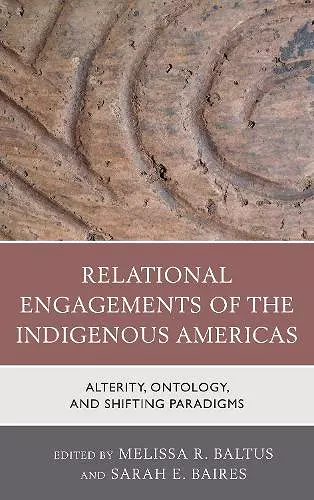Relational Engagements of the Indigenous Americas
Alterity, Ontology, and Shifting Paradigms
Melissa R Baltus editor Sarah E Baires editor
Format:Hardback
Publisher:Bloomsbury Publishing PLC
Published:16th Oct '17
Currently unavailable, and unfortunately no date known when it will be back

In Relational Engagements of the Indigenous Americas, Melissa R. Baltus and Sarah E. Baires critically examine the current understanding of relationality in the Americas, covering a diverse range of topics from Indigenous cosmologies to the life-world of the Inuit dog. The contributors to this wide-ranging edited collection interrogate and discuss the multiple natures of relational ontologies, touching on the ever-changing, fluid, and varied ways that people, both alive and dead, relate and related to their surrounding world. While the case studies presented in this collection all stem from the New World, the Indigenous histories and archaeological interpretations vary widely and the boundaries of relational theory challenge current preconceptions about earlier ways of life in the Indigenous Americas.
Relational Engagements of the Indigenous Americas: Alterity, Ontology, and Shifting Paradigms asks and attempts to answer some of the big questions facing archaeology today: what is impact and role of the ontological turn in archaeological interpretations of the Indigenous Americas? How are we to understand and recognize multiple forms of agency and animacy? And how can archaeology approach the ontological turn without engaging in neocolonial theorizing that erases, ignores, or claims ownership over Indigenous epistemologies? Baltus and Baires’s volume advances archaeological theorizing about relationality and multiple ontologies in the past and the present. The diverse case studies highlight the vibrancy of past lifeworlds in new and exciting ways. -- Meghan E. Buchanan, Auburn University
In this volume, Melissa R. Baltus and Sarah E. Baires have brought together a group of scholars whose works reflects the state-of-the-art in theoretical debates around relational ontologies. This is a rapidly growing and multidisciplinary literature, but what marks this volume out as so distinctive is the degree to which all the contributors have thoughtfully engaged with the recent critiques of how indigeneity has been presented in relational theory. The result is a timely and sophisticated collection of essays that offers a significant step forward in our conceptualization of Indigenous pasts. Researchers and students working in this area who have not yet read it will quickly find themselves out of date. -- Darryl Wilkinson, University of Cambridge
Melissa R. Baltus and Sarah E. Baires have assembled a set of papers that engage with the relational turn in contemporary archaeology by forefronting the reciprocal relationships between persons and other than-persons and things in Precolumbian North America. This volume challenges scholars to shift their focus beyond human-centered explanatory models and to incorporate the agency and ontologies of animals, objects, minerals, and other non-human social beings. The result is an invitation to understand past worlds in terms of a dense web of active engagements which push disciplinary conventions and the creation of knowledge about the North American past into new and exciting areas. -- Jennifer Birch, University of Georgia
Relational ontologies provide a unique and powerful framework for examining the intersecting social lives of things, persons, animals, non-human agents, and places. The promise of relational ontologies lies in the possibility of accounting for, and ethically addressing, the knowledge and lifeways of Indigenous communities whose histories we consider. Early archaeological uses of these concepts were largely derivative of the social theory, and indigenous groups, that inspired them. This volume successfully demonstrates that archaeology’s material focus provides a unique space for exploring how relational ontologies are generative of diverse and complex social histories amid an array of actors, human and otherwise. The editors and contributing authors provide compelling and highly readable accounts that showcase the diversity of ancient and contemporary human and non-human social relations, but of equal importance, they provide readers with new concepts and methods for exploring the histories and lifeworlds of ancient communities. -- Asa R. Randall, University of Oklahoma
ISBN: 9781498555357
Dimensions: 238mm x 159mm x 19mm
Weight: 476g
184 pages